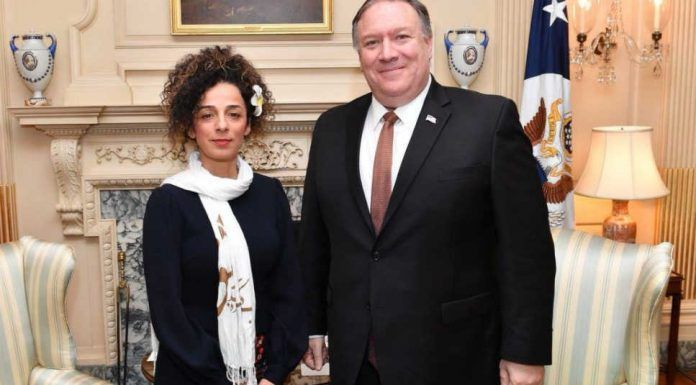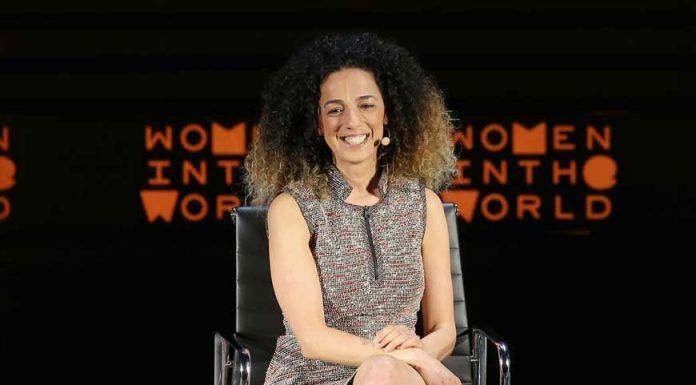By Ahmad Rafat
The Iranian journalist and women’s rights activist Masih Alinejad had a half-hour meeting with U.S. Secretary of State Mike Pompeo earlier this month. Alinejad’s visit to the State Department reportedly took place at Pompeo’s invitation. While Pompeo has held one-to-one talks with other prominent Iranians, it was the first time that his department issued a formal statement after one such meeting.
Alinejad was in the media spotlight last year following the publication of her book “Wind in My Hair: My Fight for Freedom in Modern Iran.” She previously received attention for her work as a women’s rights activist and the founder in 2014 of an online movement, “My Stealthy Freedom” — the name of a Facebook page she started on which many Iranian women posted photographs of themselves without the mandatory headscarf.
Alinejad currently works as a presenter, producer, and correspondent for Voice of America (VOA) and Radio Farda. She is also a contributor to London-based Manoto Television.
A few months ago, Alinejad turned down an invitation to attend a meeting between Secretary Pompeo and the Iranian community in California held at the Ronald Reagan Presidential Library in Los Angeles.
Speaking to Kayhan Life, Alinejad said: “I would have been a guest at the U.S. State Department’s event. Therefore, I would not have been able to express my views and contribute to the meeting. It could have potentially harmed my work as an independent activist. However, this time was different. During a 35-minute one-to-one meeting, I discussed my views as an activist. The occasion also gave me an opportunity to be the voice of Iranian people and represent those who have placed their trust in me.”
The following is a full text of Kayhan Life’s interview with Alinejad after her meeting with Secretary Pompeo.
Q: Did you ever imagine that one day you would hold a private meeting with the U.S. Secretary of State when you were working as a parliamentary reporter in Iran?
A: I always believed in myself despite being disparaged and ridiculed by many people. I was planning to meet President Barack Obama and his Secretary of State Hillary Clinton the first time I went to the U.S. State Department as a reporter. While I was in America, the Iranian newspaper I worked for closed down. It coincided with the Green Movement [summer of 2009], and U.S. [officials] did not want to speak with me, because they thought such a meeting might send a wrong message to the Islamic Republic. At the time many street protesters were shouting slogans such as “Obama, are you with them or with us?” Obama, however, cared more about trying to appease [Iran’s Supreme Leader Ayatollah Ali] Khamenei than the welfare of the Iranian people.
I wanted to make American officials hear the cries of ordinary Iranians. That is the reason I met with Mike Pompeo. I used to share the same views with people who had gradually come to power in Iran in the past ten years, and yet the human rights of Iranian citizens are still being violated. Therefore, I consider it my duty to be their voice.
Q: Why do you think Mike Pompeo would want to hear Iranian people’s concerns through you?
A: You need to ask Mike Pompeo that question. I can only give you my opinion.
Perhaps because I am an ordinary Iranian who was born in a family that supported the Islamic Revolution, but ultimately rejected that system. I am someone who has slowly changed, and who has fought for my most basic rights. I became a reformist journalist who eventually lost faith in the reforms and wanted change. I have learned to rely on my strength as a citizen.
I guess Pompeo chose me because I represent someone who was the product of the Islamic Republic’s education system but ultimately rebelled against its ideology. Maybe I speak for those who are not part of the power structure in Iran and have gradually realized the need for a significant change. Perhaps I am the voice of millions of women who have been systematically oppressed and have now found their strength in peaceful civil obedience.
U.S. officials have realized that they can better understand the concerns of a particular segment of Iranian society through me. I have no affiliation with religious or privileged circles inside Iran. I am a woman who has made mistakes, has suffered but has also learned, changed and grown.
Q: Do you think these types of meetings would lead to greater international support for the Iranian people in their struggle?
A: I can only speak about meetings I have held in the U.S. and in Europe in which I have always highlighted two points, namely that the Iranian people want neither a war nor theocratic rule. War would be a gift to the regime. The leaders of the Islamic Republic would use it to prove to Iranians that the U.S. is their enemy.
The primary aim of my meeting with Mike Pompeo was to tell him that it is not the Iranian public burning the American flag. In all my talks with members of the U.S. Congress and the European Parliament, I try to be the voice of those Iranians who reject the Islamic Republic and crave for a democratic and secular governing system. I try to tell them that Iranian officials are not the true representatives of the people. I ask them to expand their talks with Iran to include not only the nuclear issue but also the regime’s human rights violation of its citizens in the past 40 years.
We must make government officials in the West understand that [former President Mahmoud] Ahmadinejad, [current President Hassan] Rouhani and [Foreign Minister Javad] Zarif are not the true representatives of the Iranian people.
Q: What did you ask Pompeo to do about human rights?
A: I told Pompeo that most Iranians fear that if the U.S. engages in a dialogue with the Islamic Republic, Iran’s nuclear program will dominate the talks to the detriment of the human rights issue. As a result, Iran will become another Saudi Arabia. I gave him some examples.
Q: What examples?
A: During the nuclear talks, Catherine Ashton, the former High Representative of the European Union for Foreign Affairs and Security Policy, demanded to see social activists as a precondition to visiting Iran. She eventually met with Gohar Eshghi, mother of Sattar Beheshti [a blogger who died in early 2012 shortly after being arrested] and Narges Mohammadi [a human rights activist who has been serving a 16-year prison sentence since 2016].
After the signing of the [Iran] nuclear deal [the Joint Comprehensive Plan of Action (JCPOA) in 2015], the current EU High Representative for Foreign Affairs and Security Policy, Federica Mogherini, traveled to Iran. During her visit to Tehran, authorities arrested 29 members of the “White Wednesdays” movement. [EDITORS’ NOTE: Using the hashtag #whitewednesdays, Iranian women posted pictures and videos of themselves in the summer of 2017, wearing white headscarves or pieces of white clothing as symbols of protest against the mandatory hijab.]
Mrs. Mogherini wore a scarf and appeared in the Majlis (Iranian Parliament.) I highlighted this issue during my meeting with Pompeo.
Q: What did Mike Pompeo say?
A: His remarks are in the statement released by the State Department which highlights two issues, namely that the U.S. government will do its utmost to condemn Islamic Republic’s human rights record and will also urge the international community to do the same.
Q: You mentioned something about restrictions on Iranians. Were you referring to the travel ban and visa restrictions and if so, did you discuss it with Pompeo?
A: I told Secretary Pompeo that I could give him a complete list of senior Iranian officials whose children live in America. These include children of Majlis deputies, members of the Assembly of Experts, the Judiciary and even some of those who took American Embassy workers hostage [in1979] in Tehran. The parents of these privileged children who live in the U.S. have been chanting “Death to America” for the past 40 years, and yet they call people like me U.S. lackeys. These individuals have inserted themselves into American political life to promote the Islamic Republic’s agenda. Meanwhile, ordinary Iranians and university students cannot get visas to go to the U.S.
Q: Many people criticized you after your meeting with Mike Pompeo. A prominent journalist living in London, who had previously supported you, tweeted that you are a political activist and not a journalist. Couldn’t a journalist, in your view, be a human rights activist?
A: I’ve never claimed to be non-partisan. In my country, news is censored and the state routinely violates citizens’ human rights. Iranian media do not give voice to the people. I’m a social activist, and that is why I never got a permanent job with a foreign news outlet or newspaper because I never intended to be an unbiased reporter. The journalist you’ve mentioned has said: “Masih Alinejad is too enthusiastic.”
The real sensationalists are the ones who urge Iranians to vote for those responsible for the [1980s] mass murders and the imposition of the mandatory hijab. I was once one of those enthusiastic voters. However, I made an intelligent decision and distanced myself from those whose hands are drenched in blood and instead sided with people whose strength I have come to appreciate and admire.
Translated from Persian by Fardine Hamidi



